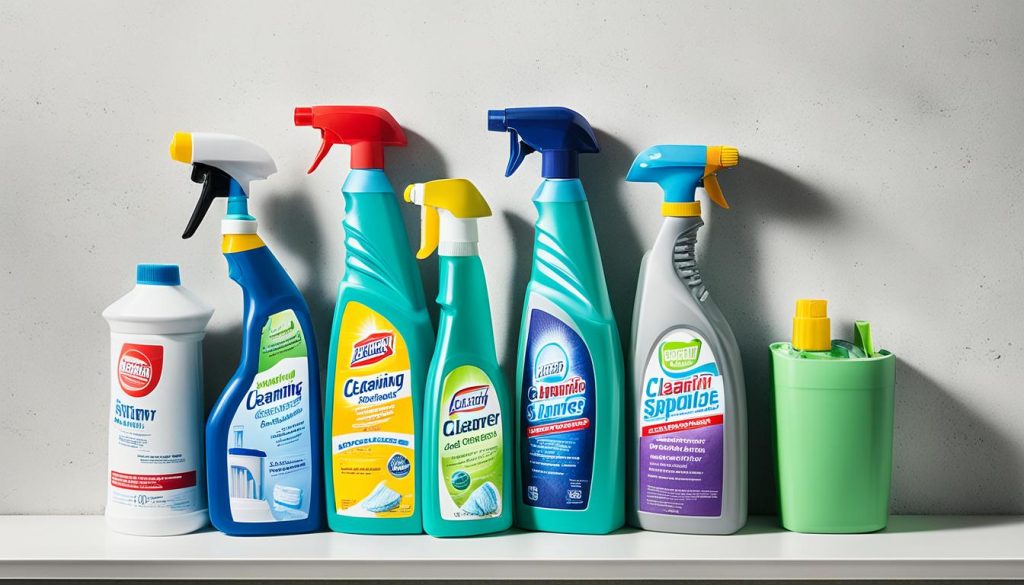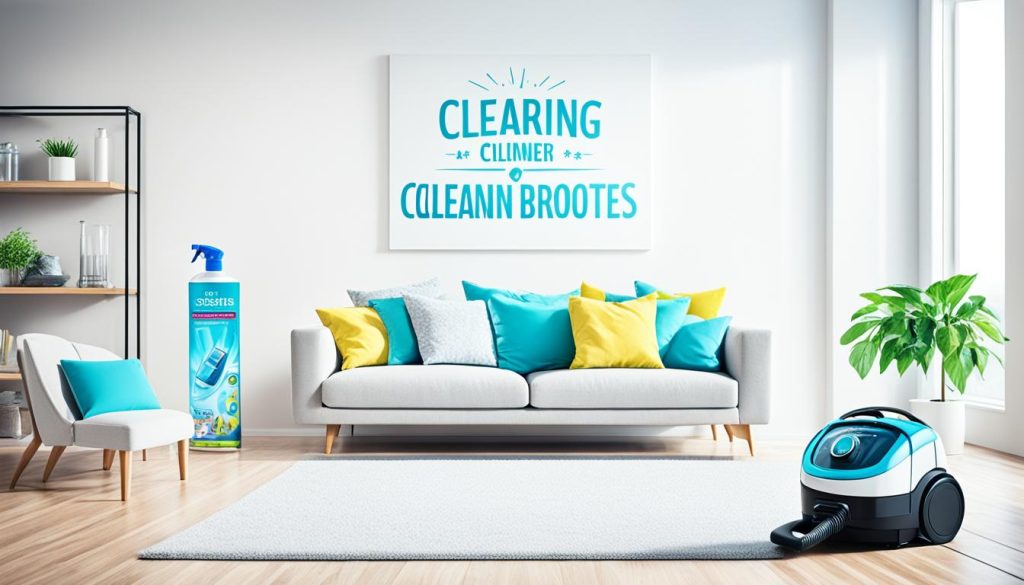The cleaning industry is doing well in the UK. About 1.47 million people work in it. This counts for 5% of the UK’s workforce. If you’re thinking of starting a home cleaning business in 2023, it’s a smart move. Such a service is always needed, and it’s not too expensive to start. We’ll help you learn how to make your cleaning business a success. We’ll talk about the benefits, types of cleaning businesses, and what you need to get started. Plus, we’ll cover how to find customers, set your prices, choose the right equipment, and grow your business.
- Introduction to the UK Cleaning Industry
- Benefits of Starting a Home Cleaning Business
- Types of Cleaning Businesses
- Identifying Your Target Market
- Licensing and Registration Requirements
- Insurance for Your Cleaning Business
- Pricing Your Cleaning Services
- Essential Cleaning Equipment and Supplies
- Home cleaning business setup
- Marketing and Advertising Strategies
- Building a Client Base
- Scaling and Growing Your Business
- Source Links
Key Takeaways
- The UK cleaning and hygiene industry employs 1.47 million people, which is 5% of the UK workforce.
- Starting a cleaning business has low start-up costs and offers flexibility in working hours and job selection.
- Residential, commercial, and specialised cleaning are the three main types of cleaning businesses in the UK.
- Registering the business with HMRC and obtaining the necessary insurance are crucial for compliance.
- Pricing should be competitive and based on the local market and target demographic.
Introduction to the UK Cleaning Industry
The UK cleaning sector is key and always growing. It provides jobs for many people. The industry has 1.47 million workers, making up 5% of the UK’s workforce. This shows how jobs in cleaning are popular and needed in the United Kingdom.
Demand for Cleaners in the UK
More details come from the British Cleaning Council (BCC). They say there were 66,420 cleaning companies in the UK in 2020. This big number shows the country needs a lot of cleaning help. It’s great news for those thinking of starting their own cleaning business.
Cleaning Industry Statistics and Worth
Looking closer, the UK cleaning industry is valued at over £55.5 million. These values keep going up. The industry’s size and growth make it a good choice for people wanting to own a business.
Benefits of Starting a Home Cleaning Business
Starting a home cleaning business in the UK has lots of perks. It has low start-up costs and offers flexibility in working hours. This makes it a great choice for those wanting a rewarding and flexible job.
Low Start-up Costs
A key advantage of a home cleaning business is the low starting costs. You don’t need a shop or stock at first. This lets you invest in cleaning supplies, transport, and insurance.
Flexibility in Working Hours
One big plus of the cleaning industry is the flexibility in hours. Owners can set their own work times. This is unlike fixed 9-to-5 jobs. Such control aids in a better work-life balance and meeting personal needs.
Freedom to Choose Jobs
Cleaning business owners can freely choose their work. They pick the cleaning tasks they enjoy and are good at. This choice boosts job satisfaction and their feeling of professional control.
No Experience Required
Perhaps the most appealing part of a home cleaning business is the easy entry. You don’t need prior experience or special training. This makes it inviting for anyone wanting to start a business.
Ability to Shape Company Culture
As one’s cleaning business grows, so does the chance to set its culture. Owners can shape the company’s values and work atmosphere. This helps create a place that reflects their own beliefs, increasing pride in their venture.
Types of Cleaning Businesses
Starting a cleaning business in the UK means choosing from three types: residential, commercial, and specialised. Each has unique parts that fit different skills, resources, and market. Knowing these helps pick the best for you.
Residential Cleaning
Residential cleaning is for people’s homes. You clean everything from dust and dirt to clothes. This business suits families, working people, and those living in shared flats or apartments.
Commercial Cleaning
Commercial cleaning focuses on other companies’ places like offices, schools, and shops. Jobs are often on a contract and done after hours. It can bring in good money with big jobs and regular clients.
Specialised Cleaning
Specialised cleaning means offering specific services like window cleaning or cleaning up after events. It needs special skills, equipment, and knowledge. Serving a particular need in the market can make your business stand out.
By knowing the cleaning business types, you can tailor your services and approach. This makes you right for the residential, commercial, or specialised market you choose.
Identifying Your Target Market

Starting a cleaning business in the UK means you need to know your target market well. Who you aim to serve depends on what you do. If you clean houses and apartments, you aim at families, working people, and those who share places.
Cleaning businesses that deal with offices and other commercial spaces are different. They cater to shops, hospitals, and schools. They often have contracts and work when these places are closed.
Specialised cleaning services have their own target clients. For example, a graffiti cleaning service might look to serve local councils. A team that handles medical waste would focus on helping healthcare settings.
Before you start, think about your business setup and what it needs. Consider if you’ll work alone or hire a team. Check the tools you’ll need and any special training. Also, look at your local competition and who can afford your services. Having your own transport can also be a big advantage.
Licensing and Registration Requirements
When you start a cleaning business in the UK, a few licensing and registration rules matter. Even though you don’t need a special guarantee to begin, registering your firm for tax with HMRC is a must.
Business Licensing
Running a cleaning business in the UK doesn’t need a special licence. Still, if your work includes handling specific wastes or involves tricky locations, you might. For places like medical or biohazard cleaning, you likely need a licence. Entrepreneurs should look into any special rules that fit their services.
Registering with HMRC
For any cleaning business, you have to sign up with Her Majesty’s Revenue and Customs (HMRC) for taxes. If you think you’ll earn under £1,000 in your first year, legally you don’t have to. But, it’s a good idea to do it to make your business’s future progress smoother. Go to the HMRC site to sign up.
Even though it’s not required by law, getting a DBS check can make customers more trusting. This also makes it easier to get certain jobs where a check is needed. Knowing and meeting all licensing and registration rules prepares your business for success and compliance in the UK.
Insurance for Your Cleaning Business

Starting a cleaning business in the UK means you must think about insurance. Even though sole traders in cleaning don’t legally need it, it’s strongly advised. Public liability insurance is recommended by experts to protect your business.
Public Liability Insurance
This insurance covers any damage to someone’s property during your cleaning jobs. It usually costs about £120 and is a key protection for your business. If an accident happens or there’s damage to a client’s property, public liability insurance helps with costs, saving you from big financial troubles.
Employers’ Liability Insurance
For cleaning businesses with any staff – full-time, part-time, or on contract – employers’ liability insurance is a legal must. It pays for damages if an employee is injured on the job. This insurance makes sure your business can survive a compensation claim, keeping it financially secure.
Experts say it’s crucial to have the right insurance for your cleaning business. It shows you’re running a responsible business. Also, it gives your clients confidence that both their property and your team are safe.
Pricing Your Cleaning Services
Setting the right prices for your cleaning business is crucial at the beginning. The first and second sources give great tips on this key part of running your company.
Hourly Rates
At the start, aim to keep your prices low, between £10-£15 each hour. This strategy can help you get more clients early on. It’s all about building a good customer base.
Quoted Rates
Later on, when your business is bigger and you have more skills, consider a different approach. Charging a fixed monthly rate for regular cleanings, like £300-£350 for a home every week, could be the way to go.
Factoring in Competition and Demographics
But remember, your prices should match what your area needs and what competitors offer. This is vital for setting the right prices. Make sure to look closely at your market. This could help you keep your prices good for your potential clients.
The main advice from the experts is to start with lower prices per hour. Then, adjust as you grow and learn more about your trade.
Essential Cleaning Equipment and Supplies

Starting a cleaning business? You need the right gear for top service. The must-have items include microfiber cloths, dusters, and more, for a thorough clean. Also, don’t forget gloves and aprons to stay safe.
Basic Cleaning Supplies
All these supplies may cost about £150, says the source. They are the basics every cleaning pro should have. With these, they can do a great job anywhere.
Specialised Equipment
For extra services, like cleaning carpets, get special gear. A carpet cleaner, for instance, can help you earn more by offering in-depth cleanings. It’s worth the investment.
Vehicles and Transportation
You’ll need a ride to take your cleaning stuff to clients. A vehicle can cost £5,000 to £60,000. But it’s key to keeping your business running smoothly.
Home cleaning business setup
Starting a home cleaning business in the UK takes several important steps. Your business name is key. It should tell customers what you do and catch their eye.
Choosing a Business Name
If you’re going limited, check your name’s availability on the Companies House website. Or as a sole trader, pick a standout trade name. A good, memorable name helps build your brand.
Registering Your Business
After picking a name, it’s time to make things official. Register your business with the proper authorities. This ensures you’re following UK laws.
Obtaining Necessary Licenses
No special qualifications are needed for a cleaning business in the UK. But consider getting a DBS check. It makes customers more comfortable and lets you take on specific jobs. Setting up correctly is vital for success.
Marketing and Advertising Strategies

Running a successful home cleaning business in the UK needs a good mix of marketing methods. Both old-school and digital ways work well. The first and second sources lay out the best strategies for gathering new clients and keeping them happy.
Flyers and Business Cards
Using flyers and business cards is a smart, low-cost way to market a cleaning service. It can start from around £10 for 50 flyers, which is great for newbies. Making eye-catching and clear flyers or cards is key. Handing them out locally lets people know about your services and how to reach you.
Online Platforms and Listings
Being online is a must for any cleaning company today. Creating ads on sites like Gumtree doesn’t cost much, between £7 and £12. Also, being on online lists and social media helps get the word out. Using these digital tactics well boosts a cleaning business’s chances of being seen and chosen by customers.
Referral Programs
Happy clients can be the best way to get more business. The sources talk about how recommending you to others can really grow your client list. Offering a thank-you for these referrals can make a huge difference. It’s an effective, organic way to grow your business and show that people trust your service.
Building a Client Base
To start a strong client base for your cleaning business, offer free consultations. These are key for two reasons: Firstly, they let you see how much cleaning is needed. This way, your price reflects the work accurately. Secondly, they’re a chance to meet the client face-to-face. This helps build a relationship and trust.
Offering Free Consultations
Free consultations are good for both you and the client. You, as the owner, see what each customer needs. You can then adjust your service to meet those needs. Customers, on the other hand, learn about your work style and the quality you offer. This meeting can really help in gaining new clients and keeping them.
Securing Repeat Customers
Getting clients to come back is key, says the source. It’s a great way to keep money coming in regularly. By doing a great job and making clients happy, they’re more likely to hire you again. Plus, they might tell others about your good work. This helps to naturally grow how many clients you have. So, making sure your clients are happy really pays off.
Scaling and Growing Your Business
Once your cleaning business gains loyal clients and a good reputation, it’s time to grow. An effective step is to hire more cleaners. This helps serve more clients and gives you time to build your business.
Expanding your service area is another good move. You can reach new customers by offering services in nearby towns. Or, try offering special cleaning services like window cleaning or carpet cleaning. This way, you can set yourself apart and attract more clients.
Using tech can also boost your business. Consider investing in software that helps with scheduling or sending invoices. These tools can make your business more efficient. They also improve customer service and save you time to focus on growth.
Remember, growing is not only about getting more customers. It’s also about keeping high service standards and being efficient. By doing this and exploring new ways to expand, your cleaning business can do well in the UK.












